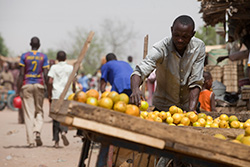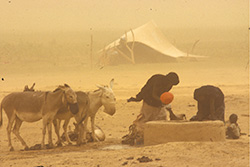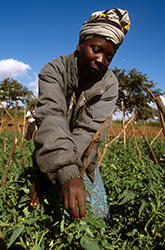The Food Security Integrated Approach Pilot
 In its capacity as a Global Environment Facility (GEF) Agency, FAO is a participating partner in the Sustainability and Resilience for Food Security in Sub-Saharan Africa Integrated Approach Pilot, known as “the Food Security IAP”. As part of this, FAO is a participating technical partner in the regional hub project and a technical executing partner in the Burundi and Uganda “child” projects.
In its capacity as a Global Environment Facility (GEF) Agency, FAO is a participating partner in the Sustainability and Resilience for Food Security in Sub-Saharan Africa Integrated Approach Pilot, known as “the Food Security IAP”. As part of this, FAO is a participating technical partner in the regional hub project and a technical executing partner in the Burundi and Uganda “child” projects.
The International Fund for Agricultural Development (IFAD) is the lead GEF Agency for the coordination of the Food Security IAP and also the host of the GEF Secretariat. IFAD leverages support from its investment portfolio on natural resource management in Africa to scale up investments in integrated approaches to sustainability.
In addition to FAO and IFAD, other GEF Agencies participating in the Food Security IAP are the UN Development Programme (UNDP), the UN Environment Programme (UNEP), the World Bank, Conservation International and the UN Industrial Development Organization.
 The Food Security IAP seeks to tackle major drivers of environmental degradation by advancing a holistic and integrated approach to enhancing agricultural productivity in smallholder systems where food insecurity is tied directly to agriculture. This approach will ensure that gender and nutrition are mainstreamed throughout the Food Security IAP, which is crucial for addressing the food security challenge. The Food Security IAP builds on existing efforts at the national and regional levels to address various policy, institutional and knowledge barriers. The long-term aim is to achieve a paradigm shift toward safeguarding natural capital and ecosystem services as a way of ensuring the long-term sustainability and resilience of production systems, particularly in drylands.
The Food Security IAP seeks to tackle major drivers of environmental degradation by advancing a holistic and integrated approach to enhancing agricultural productivity in smallholder systems where food insecurity is tied directly to agriculture. This approach will ensure that gender and nutrition are mainstreamed throughout the Food Security IAP, which is crucial for addressing the food security challenge. The Food Security IAP builds on existing efforts at the national and regional levels to address various policy, institutional and knowledge barriers. The long-term aim is to achieve a paradigm shift toward safeguarding natural capital and ecosystem services as a way of ensuring the long-term sustainability and resilience of production systems, particularly in drylands.
Roles and responsibilities have been delineated among participating GEF Agencies and technical executing partners. Four thematic reviews are underway to inform the design of the Food Security IAP and its components, as follows:
- Existing policy and scientific platforms to support dialogue and advocacy for the mainstreaming of ecosystem services, climate resilience and gender-sensitive approaches to food security, as well as to support innovations – led by FAO and UNEP.
- Approaches aimed at integrating sustainability and resilience into regional staple food-crop value chains – led by UNDP and AGRA.
- Agricultural advisory service delivery and opportunities for scaling up participatory integrated natural resource management – led by FAO.
FAO is a GEF Agency and a technical executing partner in the Burundi and Uganda projects and the regional hub project, within the Food Security IAP.
The Ugandan project, “Fostering Sustainability and Resilience for Food Security in the Karamoja Subregion”, employs a targeted approach in the northeastern Ugandan subregion of Karamoja, which faces major challenges in achieving food security. The project will enable the government to strengthen its national platform for investments in sustainable land management aimed at integrating the wider needs of affected communities in the subregion. The platform will be broadened to include other stakeholders, such as those associated with market development (i.e. the private sector). Efforts to scale up will focus on creating opportunities in the value chain for smallholder farmers in the subregion.
 The Burundian project, “Support for Sustainable Food Production and Enhancement of Food Security and Climate Resilience in Burundi’s Highlands”, is establishing a coherent and multisectoral approach to tackling environmental degradation and food insecurity in five high-plateau provinces – Bururi, Mwaro, Muramvya, Kayanza and Ngozi. The national policy context includes a focus on combating poverty, land degradation and natural disasters, biodiversity conservation, and agricultural development.
The Burundian project, “Support for Sustainable Food Production and Enhancement of Food Security and Climate Resilience in Burundi’s Highlands”, is establishing a coherent and multisectoral approach to tackling environmental degradation and food insecurity in five high-plateau provinces – Bururi, Mwaro, Muramvya, Kayanza and Ngozi. The national policy context includes a focus on combating poverty, land degradation and natural disasters, biodiversity conservation, and agricultural development.
The Food Security IAP comprises one cross-cutting regional hub project and 12 country-level projects in Burkina Faso, Burundi, Ethiopia, Ghana, Kenya, Malawi, Niger, Nigeria, Swaziland, Senegal, Uganda and the United Republic of Tanzania.
The cross-cutting regional hub project addresses capacity building, knowledge services and coordination. It will establish mechanisms to support the 12 country-level projects, with the overall objective of integrating the sound management of natural capital and ecosystem services into investments aimed at improving smallholder agriculture and food security.
